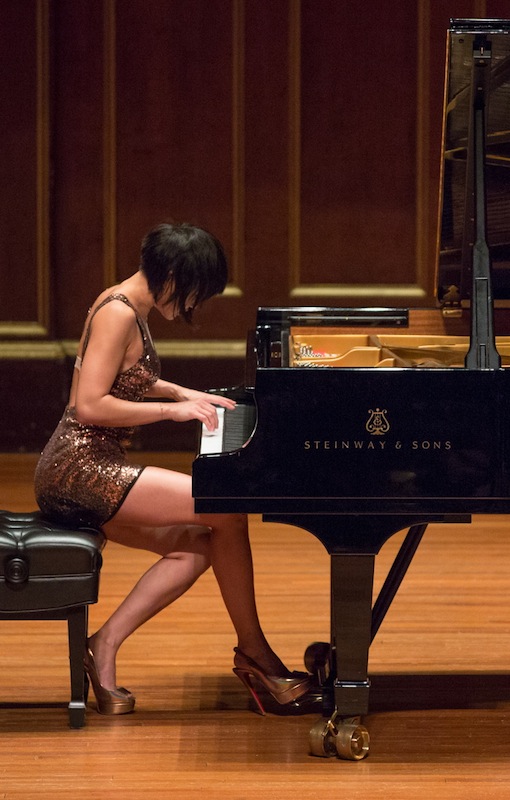Wang’s powerful virtuosity stronger on flash than depth in Celebrity Series recital
There is no doubting Yuja Wang’s technique at the keyboard. The Chinese-born pianist is capable of unleashing torrents of octave runs, and her left-hand figures supply an almost orchestral sense of depth and gravity to her sound. She clearly shapes every phrase, and her notes resonate with a ping.
Her power and precision in her Celebrity Series recital at Jordan Hall Friday night was even more remarkable given that Wang has lately suffered from illness, causing her to cancel the first five performances of her current North American tour. But she was in prime form in her first solo appearance in Boston since 2013. As far as technical finesse was concerned, she delivered a performance that managed to sparkle down to the finest detail.
Romantic and 20th-century Russian music has long been a specialty for Wang. She is equally at home in Prokofiev’s driving passages and Rachmaninoff’s surging lines. In the former’s Sonata No. 8, heard Friday night, Wang found both haunting introspection and biting sarcasm.
The last of the composer’s three “War Sonatas,” Sonata No. 8 is both contemplative and blazingly difficult. In the first movement, Wang unfolded Prokofiev’s wandering themes with searching expression. Her approach to the running second theme was brisk though understated, the music shining with faint light.
In the second movement, Wang’s silky tone and gentle rubato shading made the most of the yearning Schumann-esque lines. The final movement had plenty of fireworks as the pianist played the runs and the off-kilter waltz with percussive articulation and momentum.
Wang’s performance of Scriabin’s Sonata No. 10 was likewise a scene of elegance and frenzy. In what the composer called “a sonata of insects,” the single-movement work buzzes and chirps. Trills dot this prickly score, and Wang crafted each utterance with urgency, as a distinct episode within a larger structure. Elsewhere, Wang lingered, and Scriabin’s eerie harmonies and thorny passages were left to hang in space.
Still, there were times Friday night when one wondered if Wang only saw some of this music as just showpieces for her mesmerizing technical skill. Her selections of Rachmaninoff Preludes and Études-tableaux, though played deftly, didn’t always flower with the vocal quality so integral to the composer’s style.
Wang takes a full-bodied approach to Rachmaninoff, and she renders his textures in multi-dimensional shapes. In the Prelude in G minor, Op. 23, No. 5, her strong left hand figures tethered the march rhythms to the ground. The Prelude in B minor, Op. 32, No. 10 unfolded in Debussyian washes of color. In the Étude-tableau in E-flat minor, Op. 39, No. 5, Wang’s harmonies and bass lines crashed together in blistering clusters. But in each, Rachmaninoff sense of sweeping grandeur went largely unexplored.
Three of Ligeti’s Etudes, which filled out the program, were similarly muscular but lacking in probing musicality. Wang’s running chromatic figures blurred into a fog in Etude No. 9, “Vertige,” and in Etude No. 1, “Désordre,” churning Bartókian rhythms propelled the music ever forward. In Etude No. 3, “Touches bloquées,” Wang’s performance needed more of the intimacy that this music requires. Though Wang played the work quickly—as marked—the Etude’s halo-like harmonics, caused by the pianist keeping some of the keys depressed with the left hand while punching out syncopated figures with the right, failed to shimmer. Ligeti incorporated difficult passages into these works not as vehicles for showboating but to create ethereal musical tapestries. And throughout, it seemed as if Wang was playing Ligeti’s notes, not Ligeti’s music.
Wang’s many encores, though, delivered moments of radiant lyricism that sometimes were missing from the programmed recital. Mendelssohn’s Song Without Words in F-sharp minor managed to ring beautifully alongside her glistening readings of Rachmaninoff’s Vocalise and Gluck’s Melodie in D. Liszt’s transcription of Schubert’s Gretchen am Spinnrade set the air spinning, and the third movement from Prokofiev’s Sonata No. 7 again featured Wang in bold playing and fiery intensity.
The next Celebrity Series event will feature saxophonist Joshua Redman and the Brooklyn Rider String Quartet 8 p.m. May 19 at the Berklee Performance Center. celebrityseries.org; 617- 482-6661
Posted in Performances
